
Youth activism is the participation in community organizing for social change by persons between the ages of 15–24. Youth activism has led to a shift in political participation and activism. A notable shift within youth activism is the rise of “Alter-Activism” resulting in an emphasis on lived experiences and connectivity amongst young activists. The young activists have taken lead roles in public protest and advocacy around many issues like climate change, abortion rights and gun violence. Different from past protest or advocacy, technology has become the backbone to many of these modern youth movements. It has been shown in multiple studies that internet use along with seeking information online is shown to have positive impacts on political engagement. Popular applications like Twitter, Instagram and YouTube have become the newest tools for young activists in the 21st century. Technology and the use of digital media has changed the way youth participate in activism globally, and youth are more active in media than older generations.
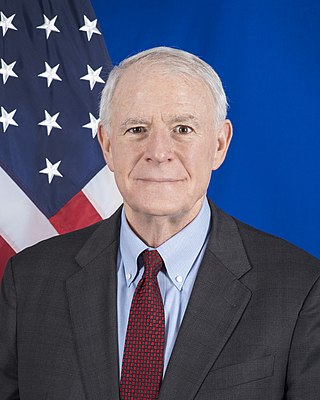
Thomas Mark Barrett is an American diplomat and politician who has served as the United States ambassador to Luxembourg since 2022. He previously served as the 44th mayor of Milwaukee, Wisconsin from 2004 until 2021.
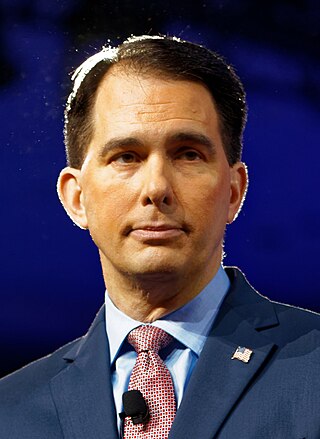
Scott Kevin Walker is an American politician who served as the 45th governor of Wisconsin from 2011 to 2019. A member of the Republican Party, he previously served as Milwaukee County executive from 2002 to 2010.

Brat Fest, which bills itself as "World's Largest Brat Fest", is an annual fundraiser held in Madison, Wisconsin.

Glenn S. Grothman is an American attorney and politician serving as the U.S. representative from Wisconsin's 6th congressional district. A member of the Republican Party, he was first elected to his seat in 2014.

The American Federation of State, County and Municipal Employees (AFSCME) is the largest trade union of public employees in the United States. It represents 1.3 million public sector employees and retirees, including health care workers, corrections officers, sanitation workers, police officers, firefighters, and childcare providers. Founded in Madison, Wisconsin, in 1932, AFSCME is part of the AFL–CIO, one of the two main labor federations in the United States. AFSCME has had four presidents since its founding.

American Majority is a nonprofit organization that provides training to conservative activists and political candidates in the United States. Registered as a 501(c)(3) non-profit organization, American Majority says that it "is dedicated to developing a new generation of American leadership that will reject the self-destructive policies associated with government expansion."

The 2011 Wisconsin protests were a series of demonstrations in the state of Wisconsin in the United States beginning in February involving as many as 100,000 protesters opposing the 2011 Wisconsin Act 10, also called the "Wisconsin Budget Repair bill." The protests centered on the Wisconsin State Capitol in Madison, with satellite protests also occurring at other municipalities throughout the state. Demonstrations took place at various college campuses, including the University of Wisconsin–Madison and the University of Wisconsin–Milwaukee. After the collective bargaining bill was upheld by the Wisconsin Supreme Court on June 14, the number of protesters declined to about 1,000 within a couple days.

In February 2011, a series of public employee protests began in the United States against proposed legislation which would weaken the power of labor unions. By March, eighteen states had proposed legislation which would remove some collective bargaining powers from unions, along with another five states which proposed legislation which would negatively affect unions. The protests occurred when public employee unions mounted protests against legislation proposed by Republican governors such as Scott Walker (Wisconsin), Rick Scott (Florida), Mitch Daniels (Indiana), Sean Parnell (Alaska), Rick Snyder (Michigan), John Kasich (Ohio), Paul LePage (Maine) and Jan Brewer (Arizona) which, among other things, would strip public employees of some collective bargaining rights as well as require higher employee contributions to pension and health care plans. The governors stated they needed these changes in order to cut state spending and balance the states' budgets. The protests began in Wisconsin, then spread to Indiana and Ohio, with unions around the country rallying to show their opposition to the proposed legislation. Several other states considered similar legislation. Virginia, North Carolina, and Texas prohibit formal collective bargaining with public employees.
The 2011 Legislative Walkout in Indiana occurred during February and March when the Democratic minority, inspired by the 2011 Wisconsin protests, fled the state to deny the Indiana House of Representatives quorum needed to pass a controversial right-to-work bill, which would have removed the legal requirement that employees pay union dues. The walkout lasted nearly six weeks, and the majority responded by fining the missing members and withholding their pay. The walkout ended after the majority agreed to table three bills, including the one that sparked the walkout, from the agenda.
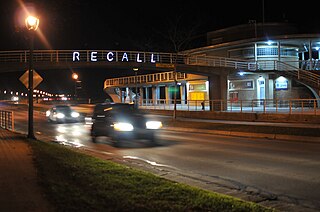
Overpass Light Brigade (OLB) is an activist collaborative public art project based in Milwaukee, Wisconsin, and organized by American artists Lane Hall and Lisa Moline and photographer Joe Brusky. The artwork is an episodic performance originally created as part of the 2011 Wisconsin protests to raise awareness about the campaign to recall Governor Scott Walker. OLB was co-founded by Hall and Moline. Brusky, a community organizer and co-founder of Occupy Riverwest, soon joined the project and facilitated its continued growth and social media presence.

The Internet Research Agency, also known as Glavset, and known in Russian Internet slang as the Trolls from Olgino, was a Russian company engaged in online propaganda and influence operations on behalf of Russian business and political interests. It was linked to Yevgeny Prigozhin, a former Russian oligarch and leader of the mercenary company, the Wagner Group, and based in Saint Petersburg, Russia.
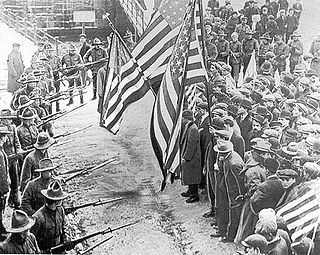
Anti-union violence in the United States is physical force intended to harm union officials, union organizers, union members, union sympathizers, or their families. It has most commonly been used either during union organizing efforts, or during strikes. The aim most often is to prevent a union from forming, to destroy an existing union, or to reduce the effectiveness of a union or a particular strike action. If strikers prevent people or goods to enter or leave a workplace, violence may be used to allow people and goods to pass the picket line.

The 2018 Wisconsin gubernatorial election took place on November 6, 2018. It occurred concurrently with a Senate election in the state, elections to the state's U.S. House seats, and various other elections. Incumbent Republican Governor Scott Walker sought re-election to a third term, and was challenged by Democratic candidate and then-Superintendent of Public Instruction Tony Evers, as well as Libertarian Phil Anderson and independent Maggie Turnbull. Evers, along with his running mate Mandela Barnes, managed to defeat Walker and Lieutenant Governor Rebecca Kleefisch in a closely fought and widely watched race, ending unified Republican control of the state.

March for Our Lives (MFOL) is a student-led organization which leads demonstrations in support of gun control legislation. It took place in Washington, D.C., on March 24, 2018, with over 880 sibling events throughout the United States and around the world, and was planned by Never Again MSD in collaboration with the nonprofit organization Everytown for Gun Safety. The event followed the Marjory Stoneman Douglas High School shooting a month earlier, which was described by several media outlets as a possible tipping point for gun control legislation.
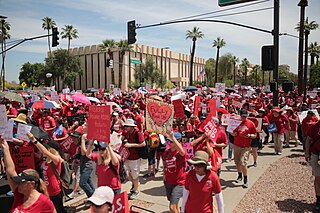
The 2018 Arizona teachers' strike was held from April 26–May 3, 2018, by 20,000 teachers to protest low pay and cuts to school funding. Arizona Governor Doug Ducey had approved a proposal giving a 20 percent raise to teachers by 2020, with a 9 percent raise in 2019; teachers rejected this proposal as it did not provide increased funding for schools themselves or raises for support staff. It coincided with a similar strike in neighboring Colorado.
MeWe is a global social media and social networking service. As a company based in Los Angeles, California it is also known as Sgrouples, Inc., doing business as MeWe. The site has been described as a Facebook alternative due to its focus on data privacy.

The 2019–2020 Hong Kong protests happened as a result of the Anti-Extradition Law Amendment Bill. Some observed that it is an extension to the 2014 Umbrella Movement, and there are other underlying issues that amounted to such explosive protest, which cover the economic, social and environmental aspects. With the Chinese Government's attempt in turning Hong Kong to a semi-authoritarian regime, it sparked Hong Kong people's dissent as the Chinese Government's intervention would threaten the Rule of Law in Hong Kong. Thus, people in Hong Kong shown their resistance through protesting, and planning through the use of social media have facilitated the social movements..
The 2021 Netflix walkout was a labor dispute involving a number of workers at American streaming and production company Netflix in late 2021. After several workers spoke out against The Closer, a controversial stand-up comedy special released by Netflix, the company's response sparked further controversy, leading to a walkout organized by the Netflix trans employee resource group.

Scott Ryan Presler is an American conservative activist. Briefly an organizer for the Republican Party of Virginia before the 2016 U.S. elections, Presler came to prominence as coordinator of the "March Against Sharia" events organized by anti-Muslim advocacy group ACT for America.

















